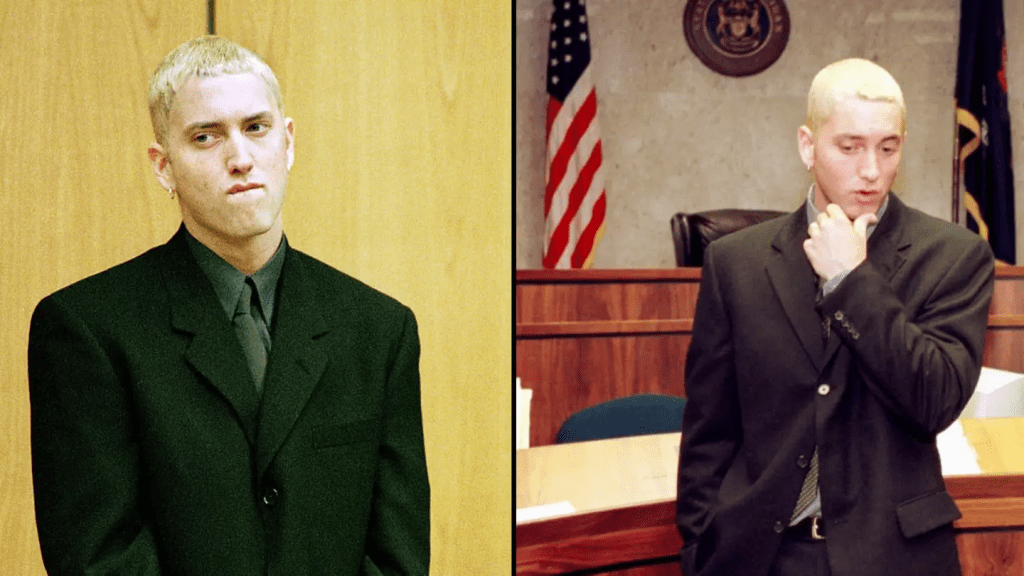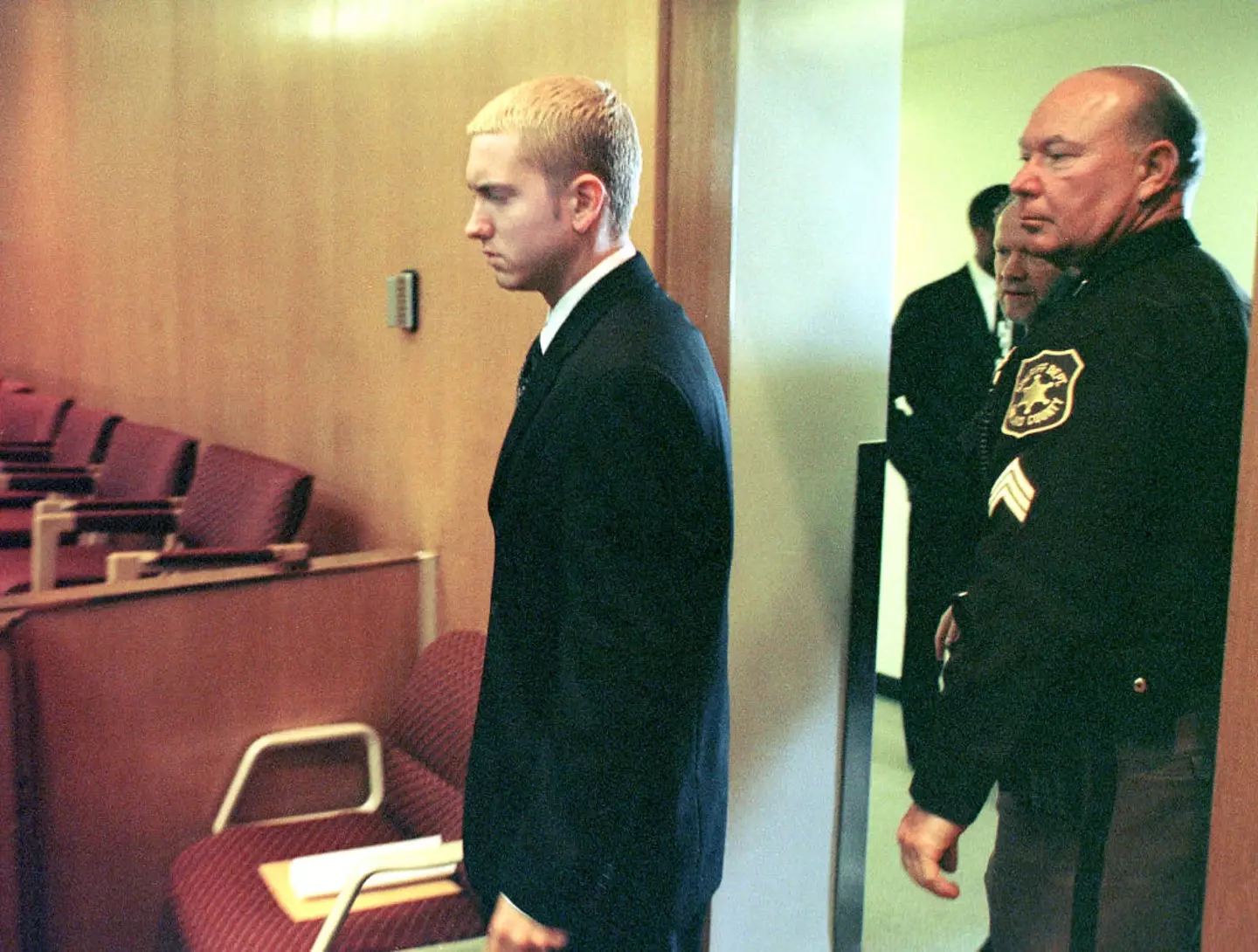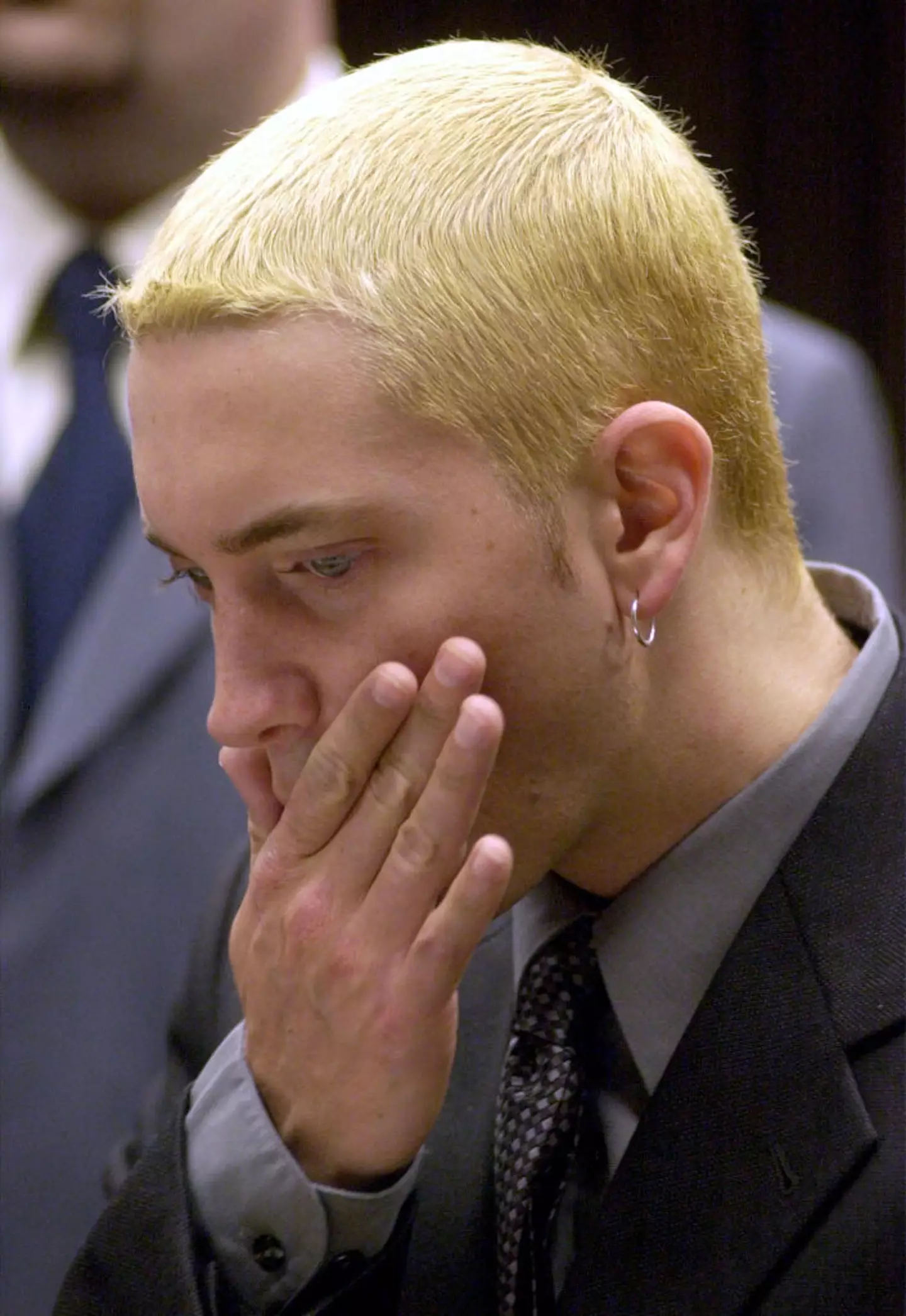In the early 2000s, Eminem was the hottest name in rap, breaking records and pushing boundaries with his bold lyrics and unmatched flow. However, his rise to fame wasn’t without controversy or legal trouble. Born Marshall Mathers III, Eminem had a series of run-ins with the law that added to his already controversial persona.

One of the most significant moments came in 2001 when Eminem faced two serious charges: carrying a concealed weapon and brandishing a weapon. The charges stemmed from an altercation with members of a Detroit rap group in a parking lot, where Eminem reportedly pulled out an unloaded 9mm semi-automatic gun. The incident threatened to derail his career, as he faced a potential five-year prison sentence.
A Narrow Escape from Prison: The Verdict in Eminem’s 2001 Case
Eminem’s June 2001 court date was a pivotal moment in his life. With the possibility of a lengthy prison sentence looming, it could have put a significant halt to his rapidly rising career. However, luck was on Eminem’s side that day.
Instead of a harsh sentence, the judge, Circuit Judge Denise Langford Morris, opted for leniency. Eminem was sentenced to one year of probation, ordered to pay more than $2,300 in fines and court fees, and required to complete community service. Eminem also pleaded “no contest” to both charges, acknowledging that the weapon was indeed unloaded during the confrontation.
Witnesses confirmed that Eminem never pointed the gun at anyone, a detail that likely contributed to the lighter sentence. Eminem’s defense attorney, Wally Piszczatowski, called the ruling “fair” and expressed his client’s relief. “He’s happy the criminal cases are over,” Piszczatowski said. “The judge treated him like any other citizen, not based on his celebrity status.”
The Judge’s Ironic Line: A ‘Real Slim Shady’ Moment in Court
Amid the serious nature of the trial, there was one moment that stood out as both surreal and iconic. While delivering the verdict, Judge Denise Langford Morris couldn’t resist quoting one of Eminem’s most famous songs, “The Real Slim Shady.” In a moment that seemed tailor-made for a headline, she addressed Eminem directly:
“Mr. Mathers, now is the time for you to please stand up.”
It was a perfect play on the lyrics from Eminem’s smash hit, The Real Slim Shady, which had catapulted him to global fame just a year earlier. For a judge to use such a line during sentencing was not only ironic but also highlighted the cultural impact of Eminem’s music—even in a courtroom.
The Aftermath: Eminem’s Reaction and Legal Team’s Response
While the courtroom line added a moment of levity, the situation was still serious. Judge Morris warned Eminem that he was lucky no one was injured during the incident, calling his actions “poor judgment.” Eminem, who remained mostly silent during the sentencing, responded only with a respectful “No, ma’am” to the judge’s questions. His demeanor during the trial was noticeably subdued, a far cry from the outspoken and often rebellious persona he showcased in his music.

The prosecutor, Mark Bilkovic, had pushed for a harsher sentence, even requesting jail time for Eminem. However, he later expressed satisfaction with the outcome, noting that the probation would serve as a “hammer over his head” for the next year. “If he screws up one time, she’ll be on him,” Bilkovic stated, emphasizing that Eminem would need to stay out of trouble to avoid more severe consequences.
Eminem’s Career in 2001: A Year of Highs and Lows
The year 2001 was a rollercoaster for Eminem. While the courtroom drama unfolded, Eminem was also experiencing major success in his music career. That same year, his album The Marshall Mathers LP was nominated for Album of the Year at the Grammy Awards. Eminem also delivered a memorable performance of “Stan” with Elton John at the Grammy ceremony—a moment that was both shocking and unifying, as it signaled Eminem’s acceptance into mainstream music despite his controversial lyrics.
The juxtaposition of Eminem’s legal issues with his professional accolades painted a complex picture of the artist. On one hand, he was a Grammy-nominated star breaking barriers in the music industry. On the other, he was a young man navigating the challenges of fame and personal demons that sometimes spilled over into real-life conflicts.
The Lasting Impact of Eminem’s Legal Battles
Eminem’s encounter with Judge Denise Langford Morris was more than just a legal matter—it became a part of his story, adding another layer to his already notorious persona. The courtroom quip about The Real Slim Shady became a memorable moment in pop culture, further solidifying Eminem’s place as a defining artist of the early 2000s.

Despite the legal challenges, Eminem managed to turn things around, using his experiences to fuel more music and remain one of the most successful rappers of all time. Songs like “Sing for the Moment” and “Mockingbird” later touched on themes of personal struggles, growth, and the complicated journey of being in the public eye.
The Legacy of the ‘Real Slim Shady’ Courtroom Moment
Judge Morris’s decision to incorporate Eminem’s lyrics during sentencing was more than a clever line—it was a reminder of the cultural weight that Eminem carried, even in the most unexpected settings. It also underscored how the artist’s music had permeated society to the point where it was being referenced in legal proceedings.
For Eminem, the trial was a turning point. It marked the beginning of a more disciplined approach to both his career and personal life. While he continued to face controversies, the experience seemed to ground him, making him more aware of the consequences of his actions.
Conclusion: Eminem’s Journey from Courtroom to Legend
The courtroom incident in 2001 was just one chapter in Eminem’s complex career, filled with highs, lows, and more than a few ironic twists. Judge Morris’s use of the Real Slim Shady lyrics during sentencing is still remembered as one of the most memorable moments in both legal and music history.
Eminem’s story serves as a reminder that even the most successful artists can stumble, but it’s how they rise from these setbacks that truly defines their legacy. As for Eminem, his ability to turn legal woes into lyrical gold has only added to his enduring influence in the music world.


